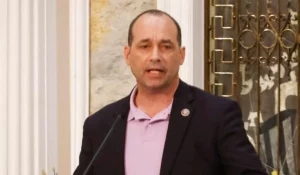
by Dick Hall-Sizemore
Here is a recent tweak in election law that did not get a lot of public attention. Effective January 1, 2024, it will be almost impossible for a political party to use a convention to nominate a candidate for a Congressional district seat. On its face the law still allows a political party of a district to determine how the nomination of candidate is made, but the 2021 change makes this stipulation:
A method of nomination shall not be selected if such method will have the practical effect of excluding participation in the nominating process by qualified voters who are otherwise eligible to participate in the nominating process under that political party’s rules but are unable to attend meetings because they are (i) a member of a uniformed service, as defined in § 24.2-452, on active duty; (ii) temporarily residing outside of the United States; (iii) a student attending a school or institution of higher education; (iv) a person with a disability; or (v) a person who has a communicable disease of public health threat as defined in § 32.1-48.06 or who may have come in contact with a person with such disease. However, such restriction shall not apply when selecting a candidate for a special election or nominating a candidate pursuant to § 24.2-539, or in the event that no candidate files the required paperwork by the deadline prescribed in § 24.2-522.
The next paragraph of the section makes an exception for General Assembly seats. It still allows incumbents in those seats to choose the method of nomination. (Of course, the members of the General Assembly are going to protect themselves!)
The legislation was introduced by Del. Dan Helmer (D-Fairfax). It passed on a straight party-line vote in the House, but had bipartisan support in the Senate.
It will be interesting to see if any Republican challenges Rep. Bob Good (R) for the nomination in the Fifth District next year. With Virginia’s open primary elections, that could make it a fun race to watch.
(Hat tip to Dwight Yancey of Cardinal News for pointing out this change in the law and for his speculation about the motivation behind Rep. Matt Gaetz’s (R-Florida) recent appearances with Good around the Fifth District.)

Leave a Reply
You must be logged in to post a comment.